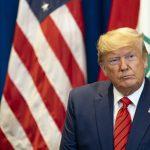An immigration judge has given the Trump administration a ticking clock to present its case against Columbia University student Mahmoud Khalil, who finds himself facing deportation for his amateurish take on international relations. Judge Jamee Comans set a deadline, demanding that federal officials deliver any evidence this week that could justify jettisoning Khalil from American soil. If they can’t substantiate their case, it seems there may be an unexpected twist in this story by Friday.
Khalil, a 30-year-old legal resident with a flair for activism, has been sitting in detention for several weeks now, presumably contemplating his life choices and how becoming a poster child for a controversial student movement landed him in hot water. His attorney, Marc Van Der Hout, appeared via video conference, making a rather bold claim about not receiving any documents that outline what exactly Khalil is being accused of. One might wonder how anyone is to plead their case without a clue about the allegations—an unfortunate oversight in what some might argue is becoming “law by ambush.”
It’s worth noting that Khalil stands out as the first college student facing deportation for his participation in anti-Israel protests, and the government is attempting to utilize a seldom-used statute that permits the Secretary of State to send noncitizens packing if they are deemed a risk in terms of foreign policy. The federal government’s vague accusations allege that Khalil’s active role in protests is tantamount to support for Hamas, the notorious militant group that has taken great pains to wreak havoc in the region. Of course, actual evidence to back these claims has been notably absent, raising eyebrows and fueling skepticism.
Meanwhile, in another eyebrow-raising case, the Department of Homeland Security (DHS) recently arrested Tufts University student Rumesya Ozturk for reasons suspiciously similar to Khalil’s. Footage of her arrest went viral, evoking a range of reactions, especially among those who believe that targeting students for their dissenting views is a slippery slope. Once again, the DHS has been criticized for failing to provide firm evidence regarding Ozturk’s supposed connections to Hamas, although her co-authored op-ed criticizing her school’s stance on Israel suggests she might just be a bit too vocal for her own good.
F**k this judge and f**k this 31 year old “student.” We don’t want you here so get the hell out. Immigration Judge Issues Ultimatum to Trump Administration Over Mahmoud Khalil Case https://t.co/I7I1txhlvy
— Damon G (@averagejoen1) April 10, 2025
In a somewhat masterful twist of bureaucracy, Columbia University is now dealing with multiple visa revocations for several of its international students involved in similar protests. While the university claims ignorance about the status of these students, one can’t help but wonder if they were too busy planning the next campus protest to bother checking their students’ legal statuses. Meanwhile, Secretary of State Marco Rubio has been proactively revoking the visas of students, asserting that educational privileges should not extend to social activism targeting the very fabric of American principles.
Critics from various corners are accusing the Trump administration of trampling on free speech rights, a familiarity that feels somewhat ironic coming from the liberal establishment notorious for its own brand of censorship. A lawyer representing one of the students claims this depicts a dictatorship—a sweeping overstatement that would be comic if the stakes weren’t so high. Khalil himself protestingly asserted that his detention highlights systemic racism against Palestinians from both the Biden and Trump administrations, a narrative that seems designed to play the victim while skipping over the elephant in the room: the substance of the accusations against him, which he is conveniently dodging.
In the ever-complex arena of immigration law and national security, Khalil’s case serves as a microcosm of larger issues at play, raising questions about activism versus legality and the parameters of free expression in educational institutions. The clock is ticking for the government to produce evidence, but in the current climate, it seems far more contentious than merely defending one student’s immigration status. With potential implications for national security and the future of dissenting voices in academia, the outcomes could be anything but predictable.




